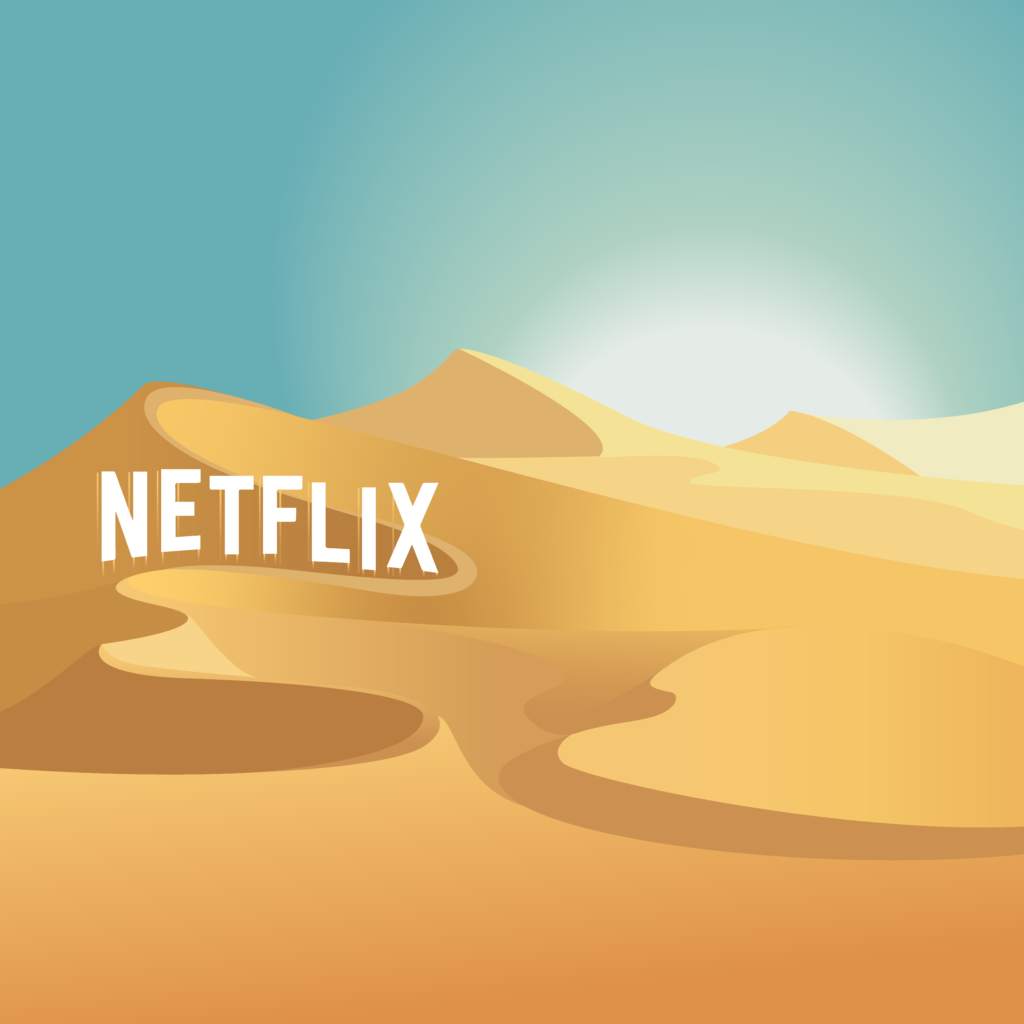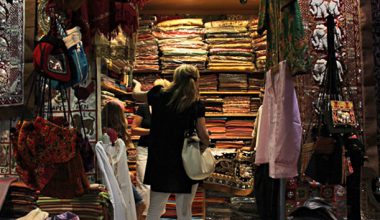Words: Dr. Abdulrahman Alghannam
English Translation: Jood AlThukair
Illustrations: Mahjabeen Ahmedi
Who would’ve imagined that a DVD home delivery service would compete against prominent Hollywood studios, European film festivals, and threaten the film industry as we know it? The impact of Netflix has made a lot of buzz recently, some people demanded its ban for threatening Arab values, and some have praised its active role in promoting local Arab content. Between this and that, how can we think about Netflix and its growing cultural and economic importance in the modern era?
One-Way Flow of Information
Perhaps one of the most prominent effects of globalization is its one-way flow of information, which facilitated the arrival and influence of Western, especially American ideologies, on third-world countries. America has been able to establish its dominance on the world through the media, including television programs, movies and series. For example, Hollywood studios benefit from distributing their work in most global markets, pursuant to international trade agreements and the principle of free-trade. CNN was also able to expand its range and be present in several regions outside America, shifting its television transmission from terrestrial broadcasting to satellites in the mid-eighties.
These global changes have contributed to theorizing new concepts and how the world lives as a "small village", where news and information are transmitted across state borders and local laws in accordance with "cultural imperialist" standards of American culture. Media and culture have become a new alternative for political hegemony, especially in developing countries—using soft power instead of military power.
Netflix Complicates the Domination of Hollywood
The Western cultural hegemony has no doubt been strengthened by the local media policy and our daily use of its content. For example, local productions are watched on terrestrial and satellite TV channels that are accessible free-of-charge, while foreign productions do not mind that we pay to watch them, whether at the cinema or on paid platforms.
Although there are some shortcomings to the concept of imperialism or cultural colonialism, it is an important perspective to explain the nature of the hierarchical relationship between American media and technology, and a global approach to culture and content creation. In light of Netflix’s strategy in creating content from different parts of the world, and the great losses of Hollywood due to the global and trade crisis between America and China, the American cultural hegemony is no longer limited to Hollywood studios, painting itself as a hero. So, there are intersections that are reshaping our concept of the relationship between individual uses and foreign content in the digital age.
It can be said that there is a new wave of globalization and cultural colonialism led by the Netflix model which perpetuates a new global monoculture using multiculturalism. Netflix began altering the style of the American cultural hegemony by investing in productions from different countries and cultures, so that the hero is normal and non-American, and their beliefs are not necessarily religious or patriotic.

Do Countries Deal with Netflix Only as a Paid Digital Platform?
In 2007, Netflix became a digital platform before expanding to Canada in 2010. Reaching more than 190 countries in 2019, Netflix declares itself a global service. Considering some countries’ stances on Netflix’s power over local TV services, it becomes clear that governments treat Netflix differently. While the internet and the technological revolution made it easier to access information, it made the process of controlling it more complicated at the level of individuals and countries.
In Europe, the stance against Netflix—as an American company—is that it must comply with cultural diversity and preserve the European legacy against unfair competition with America. A new system was enacted in 2016 requiring restrictions on Netflix’s content and strategy in European markets, even if it was at the expense of reprogramming the algorithms to highlight European content rather than recommending users based on their viewing activity.
While Canada believes in restricting any of the digital video-on-demand platforms, it is not applied on Netflix as it conflicts with the principle of free markets and digital creativity. In 2017, the Canadian government signed a contract with Netflix to establish a production center and invest $500 million Canadian dollars in Canadian content within five years, as it believes that Netflix contributes to exploring and marketing new local businesses that may have a global impact.
With the difference in the way foreign governments deal with Netflix, there is a consensus that the new ways of extending national sovereignty over the internet by paying attention to professional and unprofessional content in digital platforms are needed to achieve greater good. We must have a clear position on Netflix, its strategies, and how its global project can help us communicate what we want for the world.
Netflix and Its Interest in the Majority
It is known that Netflix employs algorithms to manipulate user data and shape its strategies based on the audience’s desire. Netflix provides its users with a continuous supply of content presented in a cinematic format to keep them attached to the platform and not to search for new content elsewhere. A key component of corporate strategy is its original content. Netflix believes that the most important way to win and satisfy a large audience around the world is by creating exclusive content and not just obtaining the rights to distribute and display Hollywood productions.
An important method that Netflix uses in displaying its digital library is personalization. It allows calculating the number of programs the user has watched and promoting the content that the company features on its platform—which may have been produced with a lower budget than Hollywood studios—but it is recommended to users who are seen to prefer such works. In other words, Netflix may threaten the permanence of the traditional film and content industry that relies on critics and ratings.
Does Our Consumption of Foreign Content Necessarily Mean That We Do Not Want to See Local or Gulf Productions?
What the audience watches on Netflix may not primarily conform to the theory of cultural colonialism, and that American productions are the only content we’re being exposed to. While there is a high demand in many countries for productions in English—as Netflix has succeeded in producing works in English that have won them a loyal audience, such as Stranger Things and House of Cards—Netflix’s non-American productions, such as Money Heist and Dark have also achieved numbers. This indicates the audience’s desire to explore new genres whenever they are distributed and presented in a distinctive way.
Also, just as the Gulf audience is accustomed to foreign content, this does not mean that it rejects local content completely. In fact, the audience does not choose between local and global content, but rather tries to combine the two in their daily life, as they switch between these metrics at different times and for different purposes. Some good examples are: the Kuwaiti mystery In Paradox (2019, dir. Hamad Al-Sarraf), the Emirati comedy Financial Crisis (2020, dir. Rakan) and the Saudi comedy Shams Al Maarif (2020, dir. Faris Godus), all of whom managed to reach the Top 10 Watched movies in the first week of their premiere on the platform.

The general pattern is that audiences still want a platform that speaks their own language, contains familiar faces and presents stories related to their culture, but in that there is an ongoing competition between Netflix and local TV platforms who may have a deeper understanding of what the local audience wants. Therefore, Netflix and foreign content are not substitutes for other TV and digital platforms and local content, but are rather complementary to them.
Is Netflix the Most Prominent Mainstream Platform Around the World?
There is no doubt that Netflix is not accessible to everyone in the Arab region due to the disparity of social classes and fast internet connections. Therefore, it remains an exclusive service in most low-income countries and is not the dominant service to which most of the population is exposed to.
Netflix has undoubtedly managed to be the most prominent platform around the world— especially in light of the circumstances imposed by the pandemic. This is due to the company’s unique business model, which has led to the formation of a strong name and customer base globally, with more to add from the Arab World. Netflix is currently an important window for watching the world, our Arab Gulf cultural heritage, and the most important incubator for accelerating local productions and improving forms of narration and storytelling.
But once an individual realizes the power of algorithms over their choices and the film and entertainment industry in general, they realize that the company’s global ambitions are somewhat of a concern. We must not lose sight of what Netflix’s colonization of local content means in defining the future of cultural production in general, which must be respected in and of itself. It is not just a project to gain more subscriptions and wealth.
Dr. Abdulrahman Alghannam is assistant professor at the King Faisal University (KSA). His research focuses specifically on the development of film and cultural industries in the Arab Gulf States. Alghannam is the co-editor of the Film Production in the Arabian Gulf: The Industry and Culture (The Arab Literature Center, 2020). His recent research about Khaleeji cinema has featured in The Political Economy of Local Cinema: A Critical Introduction (Peter Lang, 2020). Alghannam received his PhD in Film Studies from the University of St Andrews (UK) in 2021. He holds MA in Mass Communication from the University of Central Missouri (US) in 2014.
twitter.com/abdulrahghannam
instagram.com/mahjabeen.ahmedi








1 comment